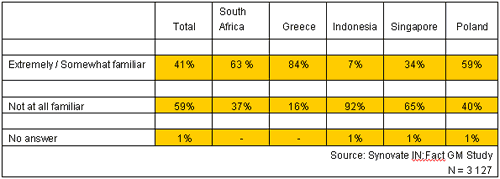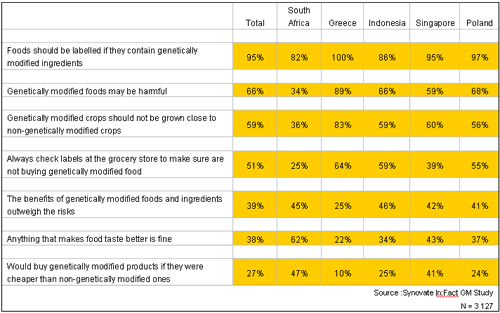
Genetically modified foods - delight? Or fright?
Genetically modified foods have been the subject of controversy amongst scientists, politicians and the media in some countries, but what do ordinary people think? To find out, Synovate surveyed 3,127 respondents in South Africa, Greece, Indonesia, Poland, and Singapore.
Even basic familiarity with genetically modified foods varies considerably. While 84 percent of Greeks are extremely or somewhat familiar with these products, 92 percent of Indonesians have not heard of that term. A majority of respondents in South Africa and Poland are also familiar with genetically modified foods, while 65 percent of Singaporeans profess ignorance.
Maria Darmi, Managing Director of Synovate Greece, is not surprised by the high awareness of genetically modified foods in that country. "Greeks have become sensitive to food scares and are more and more suspicious of food origins, because of incidents in neighbouring European countries and also sensationalism in some media."
How familiar are you with genetically modified foods?

Among consumers who are aware of genetically modified foods, a majority in Greece (89 percent), Poland (68 percent), Indonesia (66 percent) and Singapore (59 percent) believe such fare may be harmful - whereas only one-third of South Africans agree.
But Synovate found that despite these cautious feelings, 46 percent of Indonesians and 42 percent of Poles and Singaporeans believe that the benefits of genetically modified foods outweigh the risks. 45% of South Africans believe that the benefits outweigh the risk, more than half of those interviewed (54%) are already eating genetically modified foods!
62 percent of South Africans also maintain that anything that makes food taste better tastes fine - as do 43 percent of Singaporeans. In South Africa it is interesting to note that this sentiment is most strongly shared by the younger age groups. Only 53% of those aged 45 years and older agree with this statement, compared to 68% of 18 - 24 year olds.
Price also makes a difference, with 47 percent of South Africans and 41 percent of Singaporeans willing to buy genetically modified foods if they are cheaper than non- genetically modified products. By contrast, only 10 percent of Greeks display such price-consciousness.
The characteristics of genetically modified foods have not been actively marketed or communicated to South African consumers, notes Jon Salters, Synovate's Managing Director for Sub-Saharan Africa. "This has resulted in a general lack of awareness of their existence and associated risks and benefits. Given this lack of knowledge around GM foods, it is understandable that those products will make their way into the shopper's basket if the price is right."
Do you agree with the following statements?
(Base: Extremely or somewhat familiar with genetically modified foods)

CURIOSITIES
> Among those respondents who are familiar with genetically modified foods, a majority in all countries but South Africa assert that GM crops should not be grown close to non-GM foods
> Close to 40 percent of respondents in Singapore and South Africa who do not buy genetically modified foods are willing to eat those products
> Most consumers in Greece, Indonesia and Poland who have heard of genetically modified foods always check labels to make sure they are not buying such items
- Unlocking the value of creativity in advertising: How to bridge the creativity gap15 Apr 13:47
- 4 habits keeping your brand poor26 Mar 16:08
- Understanding consumer mindsets for growth in 202407 Mar 08:52
- South Africa's unemployment nightmare: The burden on its people09 May 10:05
- Global survey shows shrinking trust in internet29 Nov 10:17


















